15 Easy Ways to Improve Your Self-Esteem Quickly

In this post, discover 15 effective and powerful ways to improve your self-esteem quickly, why it matters, its benefits, and how it transforms your life and creates a more joyful, peaceful mindset!
This post contains affiliate links, which means I may earn a small commission if you make a purchase, at no cost to you. See my disclaimer for more info.
Self-esteem is something I’ve had to work on over the years. While I knew I had strengths, doubt often held me back, like many of us. But once I built my confidence, everything changed—I took more chances, set better boundaries, and started thriving in a new way.
I’m sharing these 15 essential ways to improve your self-esteem and confidence—because I know firsthand how life-changing this journey can be. When you trust yourself and recognize your worth, new opportunities open up before you.
Self-esteem (how you value yourself) and self-confidence (believing in your abilities) go hand in hand. The more you practice these habits, the stronger both will become—and the more empowered you’ll feel every day.
Here’s what improving my self-esteem has helped me achieve so far:
- Taking more risks to create positive change
- Setting and maintaining healthier boundaries
- Strengthening my positive relationships
- Becoming my biggest encourager instead of my worst critic
- Achieving goals and chasing my dreams, such as launching this very website
- Feeling more fulfilled, capable, and grateful for my life
And the best part? You can experience this transformation, too. Let’s dive in!
How is Self-Esteem Defined?
You probably have a general idea of what self-esteem means, but let’s take a closer look,
According to Dictionary.com , self-esteem is:
A realistic respect for or favorable impression of oneself; self-respect.
The American Psychological Association (APA) expands on this, explaining that:
It reflects a person’s physical self-image, view of his or her accomplishments and capabilities, and values and perceived success in living up to them… A reasonably high degree of self-esteem is considered an important ingredient of mental health, whereas low self-esteem and feelings of worthlessness are common depressive symptoms.
At its core, self-esteem is your attitude toward yourself and your worth. And as the APA points out, low self-esteem can take a toll on your mental health and overall well-being, making it an important area to nurture and strengthen.
It’s often one of the first things you’ll explore in therapy because low self-esteem is a contributing factor in mental health disorders such as depression and anxiety. (1 & 2)
A common myth is that you’re either born with high self-esteem or not. While it may come naturally to some people, self-esteem can be built and improved over time. In fact, because self-esteem can be measured, it’s clear that it’s not a fixed trait—it’s something you can actively work on and enhance. 💯
Benefits of Improving Your Self-Esteem
Boosting your self-esteem comes with excellent research-backed benefits that can lead to greater success and satisfaction with your life. And, from personal experience, investing in your self-worth is a journey well worth taking!
Recent studies and reviews from Orth U, & Robins RW 2022 make one thing clear—self-esteem really matters. Despite some old claims that it doesn’t make a big difference, tons of research shows that high self-esteem helps people succeed in all kinds of ways—at school, work, relationships, and overall well-being. (3)
The great news is that these benefits hold across different ages, genders, and backgrounds, and they aren’t about narcissism.
Some key benefits of high self-esteem (4):
- Better academic performance – Students with high self-esteem are more likely to participate in class, take on challenges, and persist through difficult subjects.
- Greater success at work – Confident employees are more likely to take initiative, seek promotions, and handle workplace stress effectively.
- Stronger relationships – People with high self-esteem set healthy boundaries, communicate openly and attract positive social connections.
- Improved mental health – Higher self-esteem is linked to lower levels of anxiety, depression, and self-doubt.
- Better physical health – People with high self-esteem are more likely to exercise regularly, maintain a balanced diet, and care for their overall well-being.
- Less likelihood of engaging in harmful behaviours – Those with strong self-esteem are less prone to substance abuse, risky decisions, and destructive habits.
- Increased resilience – Confidence helps people recover from setbacks, whether a failed exam, job rejection, or personal disappointment.
So without further adieu, here are the 15 powerful ways to improve your self-esteem…
15 Ways To Improve Your Self-Esteem
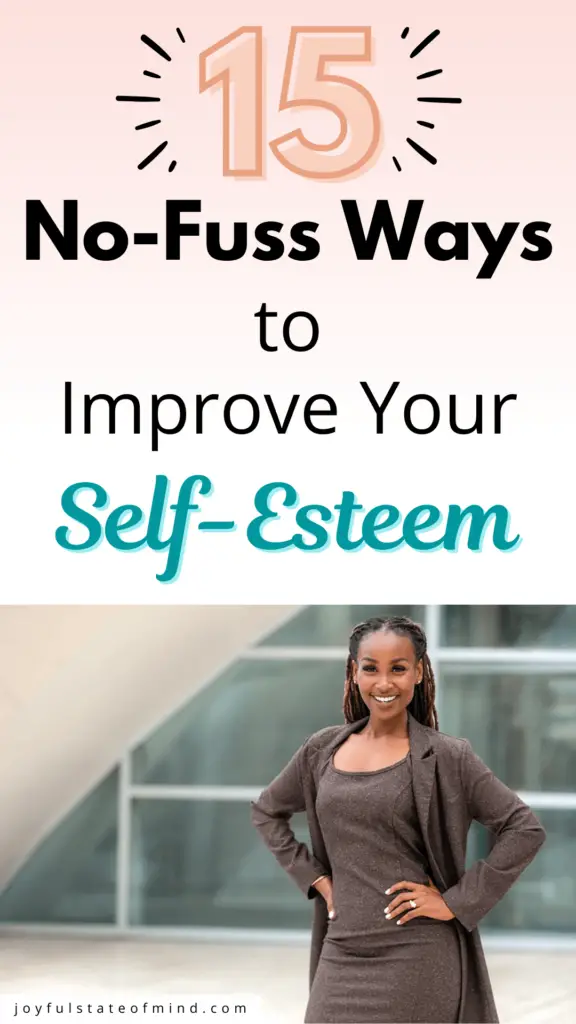
1. Break Free From Beliefs Holding You Back
Have you ever stopped to question the beliefs you hold about yourself? The ones that whisper, I’m not good enough, I’ll never succeed, or I’m just not that kind of person? These thoughts can feel like facts, but they’re just limiting beliefs—deeply ingrained assumptions that hold you back from reaching your full potential.
Marie Forleo, in her book Everything is Figureoutable, explains that holding onto limiting beliefs guarantees limited outcomes. In other words, your beliefs shape your reality—they can either heal and empower you or keep you stuck in a cycle of doubt and fear.
To build your self-esteem, a key step is to start challenging the negative beliefs that weigh you down.
Here’s how:
- Identify the belief – What negative thoughts about yourself keep coming up?
- Find the source – Where did this belief come from? Was it an experience, a comment someone made, or an assumption you’ve carried for years?
- Challenge its truth – Is this belief absolutely true? Do you have concrete evidence to prove it? Can you find evidence that contradicts it?
- Reframe it – Swap limiting beliefs for empowering ones. Instead of I’m not good enough, try I am learning and growing every day. (See number #5 below for more on this!)
2. Focus on Your Path, Not Someone Else’s.
Nothing crushes self-esteem faster than constantly comparing yourself to others. It’s easy to scroll through social media and feel like everyone else has a perfect life, but remember—what you see is a highlight reel, not reality. No one has it all together, no matter how flawless their photos look.
Focus on your journey instead of measuring your worth against someone else’s curated life.
Think about the progress you’ve made, the challenges you’ve overcome, and the ways you’re growing. The more energy you put into becoming the best version of yourself, the less power comparison has over you.
How to do this:
- Limit social media – Unfollow accounts that make you feel inadequate or trigger your insecurities.
- Focus on your growth – Keep track of your progress, not someone else’s.
- Practice gratitude – Appreciate what you do have instead of what you lack; this is a powerful mindset shift.
- Use comparison wisely – Let others’ success inspire, not discourage, you.
- Avoid triggers – Reduce exposure to people or platforms that fuel comparison.
- Remember reality – No one’s life is as perfect as it seems online.
3. Confidence Starts with Preparation
Confidence grows when you feel prepared; as someone with anxiety, doing things to be prepared for an event, situation, or even conversation with someone has always helped put my mind at ease and boosted my confidence.
Whether for your day, a big event, or a personal goal, planning helps reduce stress and lets you feel in control. When you take the time to organize your thoughts, you feel more capable of handling whatever comes your way.
Simple ways to stay prepared:
- Write it down – Keep a planner or notes on your phone.
- Break tasks into steps – Small actions make big goals feel doable.
- Create a routine – Being consistent builds confidence.
- Plan your day – Write a to-do list the night before.
- Do a quick mental checklist – Feel ready before you head out.
- Keep a backup plan – Because things don’t always go as expected.
4. Take Control of Your Body Language

Your posture, gestures, and expressions don’t just communicate with others—they send messages to your brain.
Standing tall, making eye contact, and using open, confident body language can make you feel more self-assured. Research shows that even small shifts in body language can improve mood and self-perception. (5)
How to do this:
- Stand up straight with your shoulders back—avoid slouching.
- Use open, relaxed gestures instead of crossing your arms or shrinking into yourself.
- Maintain eye contact when speaking with others.
- Smile more often—it boosts your mood and makes you appear more approachable.
- Try power poses before stressful situations (e.g., standing with your hands on your hips like a superhero).
5. Rewire Your Mind with Daily Affirmations
Your inner dialogue shapes your self-esteem. You’ll start believing it if you constantly tell yourself you’re not good enough. But if you practice daily affirmations that reinforce your strengths, you can rewire your mindset in a positive way! I’m a fan of affirmations because of their palpable impact on my self-esteem and confidence.
But I also know they’re not for everyone, and let’s be honest—affirmations like “I am unstoppable” or “I’ll be a billionaire by next year” can feel fake and even backfire if they don’t resonate.
Instead, start with truths you already believe, like “I am kind,” “I have courage,” or “I am a good writer.”
Once you’re comfortable with these, build on them to align with your goals: “I have the courage to start this new journey,” “I will persevere until I succeed,” or “Every small step I take moves me closer to my dreams.”
The more you affirm your strengths, the more your mind will believe them!
Related post: 100+ Powerful Confidence Affirmations to Boost Self-Esteem
6. Master the Art of Being Unbothered
Being unbothered isn’t about pretending nothing affects you—it’s about knowing what’s worth your energy. You gain true confidence and peace when you stop letting negativity and outside opinions dictate your self-worth.
Rather than overreacting or stressing over things beyond your control, you learn to stay grounded and secure. If you’ve always been someone who takes things personally, is sensitive to criticism, or is easily influenced by others’ moods, shifting this mindset will take practice. But with time and effort, you’ll feel lighter, freer, and more in control of your happiness.
Ways to be unbothered:
- Detach from negativity – Remember that not every comment or situation deserves your energy.
- Learn not to take things personally – Remember that people’s reactions often have more to do with them than with you. Many times, they’re projecting their issues or making unfair judgments.
- Set boundaries – Get comfortable with saying no to what drains you and yes to what uplifts you.
- Stop seeking approval – Remember that others’ opinions don’t define your worth.
- Focus on what you can control and do your best to let go of the rest.
- Practice mindfulness activities – This will help you stay present in the moment and avoid overthinking.
7. Step Outside Your Comfort Zone—One Small Step at a Time

Stepping outside your comfort zone isn’t just a one-time thing—it’s something you have to practice regularly. The more you expose yourself to uncomfortable or intimidating things, the less power they have over you. Over time, these small challenges build confidence and strengthen your self-esteem.
You don’t have to take massive risks—start with small, manageable steps. Many years ago, I never imagined sharing personal stories online, but now it feels natural. Keep challenging yourself—growth happens when you push past fear, and you never know where it might lead!
Simple ways to step out of your comfort zone:
- Try a new hobby – Sign up for a class or explore a creative activity.
- Say yes more often – Accept invitations, even if they feel uncomfortable.
- Speak up – Share your thoughts more often in meetings or conversations.
- Do something solo – Go to a movie, café, or event by yourself.
- Change your routine – Try taking a different route to work, a new workout, or going to a mall or a store you haven’t been to yet.
- Challenge negative thoughts – Replace “I can’t” with “I’ll try” or “I don’t know” with “I don’t know yet.”
Every small step builds confidence—just start where you are! 😊
8. Progress Over Perfection: The Key to Growth
Perfection is a myth, and chasing it only leads to frustration. The real secret to success? Progress.
One of my mantras is: Every small step forward counts, even if it’s not perfect!
When you focus on progress, you allow yourself to learn, improve, and build confidence without the weight of unrealistic expectations. Perfectionism only holds you back by fueling doubt and self-criticism. Instead, embrace the journey and keep moving forward—one step at a time!
15 Powerful Ways to Improve Your Self-Esteem Continues…
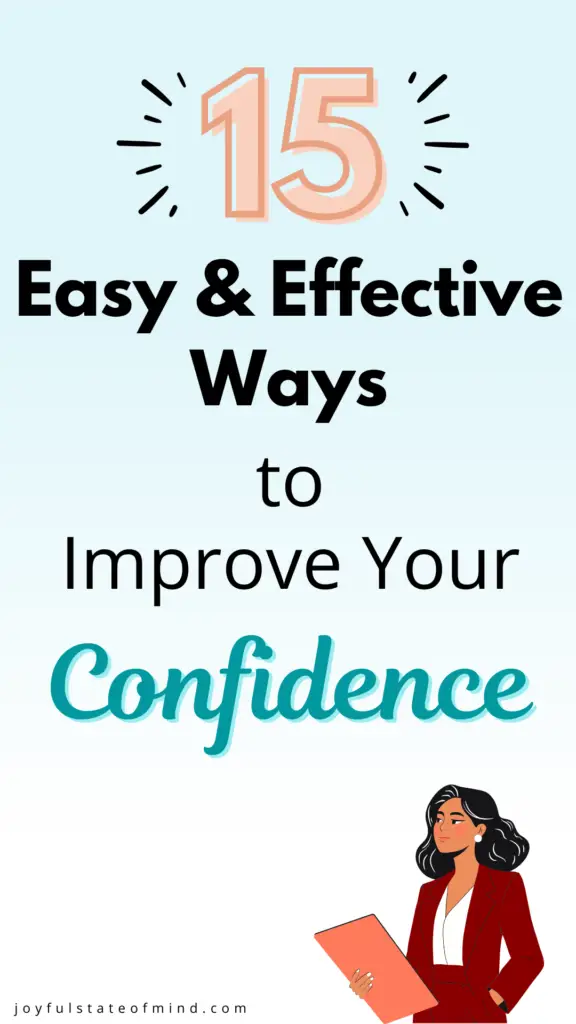
9. Stay True to You: The Power of Accountability
Holding yourself accountable means following through on your commitments, even when it’s hard. It’s about discipline—showing up for yourself daily builds self-trust and strengthens your confidence. When you take responsibility for your actions, set goals, and follow through, you prove to yourself that you’re capable, which boosts your self-esteem.
How to stay accountable:
- Set clear, realistic goals and then break them into smaller tasks.
- Track your progress with a journal or habit tracker.
- Stick to routines and daily habits that support your goals. Consistency is always key!
- Push through excuses and stay honest with yourself.
- Find an accountability partner to keep you motivated.
- Follow through—confidence grows when you keep your promises to yourself!
10. Forgiveness for Others (and Yourself).
This may not be a typical tip to improve your self-esteem, but it has impacted me, so I wanted to share. Carrying anger, regret, or resentment only hurts one person—you! Holding onto past hurts keeps you locked in negativity, which can slowly erode your confidence and happiness.
Forgiveness is a gift to yourself. It doesn’t mean forgetting or condoning what happened to you; it means choosing to no longer let it control you.
Also, don’t forget the importance of forgiving yourself for mistakes or choices you made in the past. Developing higher self-esteem will be a challenge if you’re holding on to those negative feelings towards yourself.
11. Boost Your Confidence One Page at a Time
The right book can shift your mindset, challenge your self-doubt, and inspire real change. Personal growth books offer fresh perspectives, powerful strategies, and the motivation to believe in yourself.
When you regularly fill your mind with uplifting and empowering ideas, you naturally start seeing yourself—and your potential—in a new light. It’s like having a mentor in your hands, guiding you toward confidence and self-belief.
How to use books to build confidence:
- Choose books that align with your goals (resilience, productivity, mindset). I linked to great options at the end of the post.
- Take notes on key insights and reflect on how they apply to your life.
- Put ideas into action—don’t just read; practice what you learn.
- Surround yourself with positivity by consuming a bit of empowering content daily.
- Re-read or listen to audiobooks to reinforce key lessons.
- Join a book club or discuss your knowledge with others for deeper insights.
12. Acknowledge Your Wins—No Matter How Small.
Getting caught up in chasing big dreams is easy, but don’t forget to recognize and celebrate the small wins. Did you push yourself to talk to a stranger, try a new skill, or step outside your comfort zone? Those are all steps forward, and they deserve acknowledgment!
You don’t need grand ambitions (unless that’s what you want)—just making small, positive changes, like getting more active or reading more, can help boost your self-esteem.
Celebrate these moments because they’re proof of your growth and increase your confidence and self-worth.
Related post: Celebrate Yourself: 23 Fun Ways to Boost Your Confidence
13. Surround Yourself With a Positive Tribe

The people around you have a significant impact on how you see yourself. If you’re constantly surrounded by negativity, criticism, or people who drain your energy, it’s easy to start doubting yourself. On the other hand, being around supportive and encouraging people can uplift and reinforce your self-worth.
How to do this:
- Spend more time with friends or family who genuinely support you.
- Set boundaries with people who bring you down or make you feel small.
- Join groups or communities that share your interests and values.
- Follow inspiring and uplifting content on social media.
- Be that supportive person for others—it naturally attracts the same energy back to you.
14. Own Who You Are with Confidence
True confidence comes from self-acceptance. When you embrace your quirks, strengths, and flaws without seeking approval, you naturally feel more at ease in your skin. The more you focus on what makes you unique, the stronger and more comfortable you become.
How to be comfortable in your own skin:
- Focus on what you love about yourself—make a list of your strengths.
- Wear what makes you feel good—confidence starts with feeling great in your style.
- Silence your inner critic—replace self-doubt with self-compassion.
- Take care of your body—exercise regularly and nourish yourself with healthy foods.
- Stop seeking approval—be true to who you are; you don’t need permission to be yourself.
15. Turn Setbacks Into Stepping Stones
Failure isn’t the end—it’s a lesson in disguise. Every setback is an opportunity to learn, grow, and come back stronger. A growth mindset means seeing mistakes as part of the journey, not proof that you’re not good enough.
The most successful people didn’t avoid failure—they embraced it, adapted, and kept going. Instead of dwelling on what went wrong, ask yourself: What can I learn from this? How can I improve next time?
How to develop a growth mindset:
- Reframe failure—see it as feedback, not defeat.
- Ask, “What can I learn?” after every challenge.
- Stop fearing mistakes—everyone makes them!
- Embrace challenges as chances to grow and get better.
- Celebrate effort, not just success.
- Replace “I can’t” with “I can learn how.”
BONUS:
16. Silence Your Inner Critic with Self-Compassion.
This point relates to all of the previous ways to improve your self-esteem and is the driving force behind my site. We’re often our own harshest critics, but self-compassion means treating yourself with the same kindness and grace you’d show a friend and becoming your own inner BFF.
How to practice self-compassion:
- Forgive yourself for past or present mistakes—remember, no one is perfect, and personal growth comes from learning.
- Practice self-care by prioritizing rest, being active daily, and doing activities that bring joy and relaxation.
- Show yourself grace—allow yourself to be human instead of constantly pressuring yourself to do everything on your to-do list. It’s okay to take breaks, delegate tasks (even at home) and sometimes leave things unfinished.
- Reframe negative thoughts, for example, by replacing “I failed” with “I’m learning and improving.”
- Be mindful of self-talk—this ties into the idea above. Be aware that if you wouldn’t say it to a friend, don’t say it to yourself.
The more you practice self-compassion, the easier it becomes to accept your imperfections and grow. Treat yourself with kindness, and watch your self-esteem rise!
15 Ways To Improve Your Self-Esteem: Final Thoughts
Boosting your self-esteem doesn’t have to be complicated or take years. Small, intentional actions—like practicing self-kindness, setting boundaries, or positive self-talk—can make a big difference right now. The more you invest in yourself, the stronger your confidence will grow.
So start today—pick just one tip and give it a try. You’re already on the right path, so keep going!
Bonus: Best Books to Improve Your Self-Esteem
This book is all about embracing your true self instead of chasing perfection. Brene Brown shares 10 guideposts for living with courage, self-compassion, and authenticity. She emphasizes letting go of who you think you should be and embracing who you are.
This dives into what builds confidence, especially for women. Blending science, research, and real-life stories shows that confidence isn’t just something you’re born with—it’s something you build through action, risk-taking, and changing your thinking. It’s a great guide to stepping up, speaking out, and believing in yourself.
Feel The Fear…And Do It Anyway by Susan Jeffers, PhD
This classic is about pushing past fear and self-doubt to take action in life. Susan Jeffers explains that fear never entirely disappears, but you can train yourself to move forward anyway. With practical tools and mindset shifts, this powerful book helps you build confidence, trust yourself, and go after what you want—no matter how scary it feels!
This book breaks down self-esteem into six key habits, such as living with self-awareness, taking responsibility, and staying true to your values. He explains that confidence is built through daily actions and how we treat ourselves. This is a practical guide to strengthening self-worth from the inside out.
This book is about embracing vulnerability as the key to courage, connection, and a fulfilling life. Instead of seeing it as a weakness, Brown shows how vulnerability helps us grow, build authentic relationships, and overcome shame. It’s a call to show up, be seen, and live wholeheartedly.
Bonus: 15 Improve Your Self-Esteem Quotes
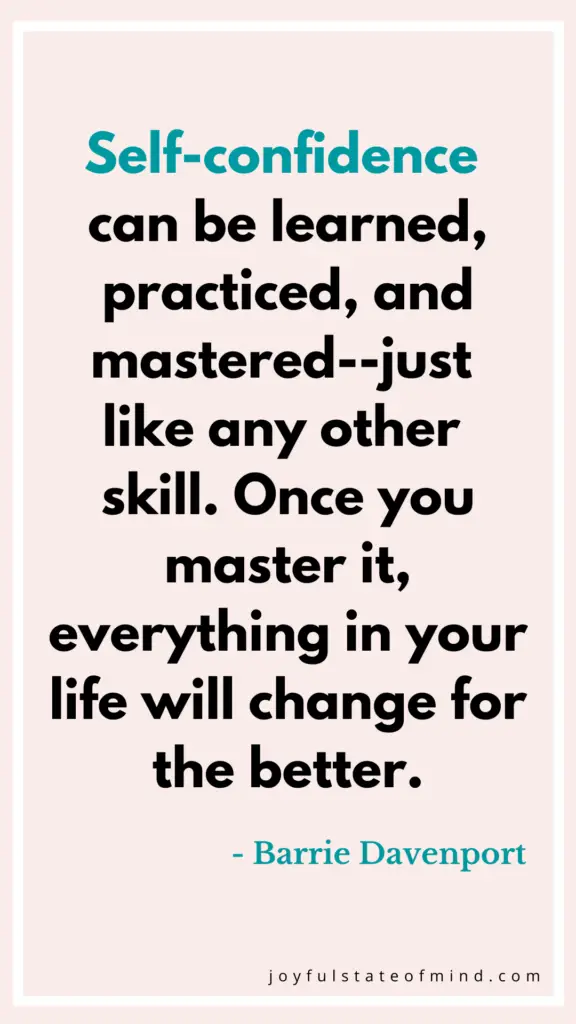

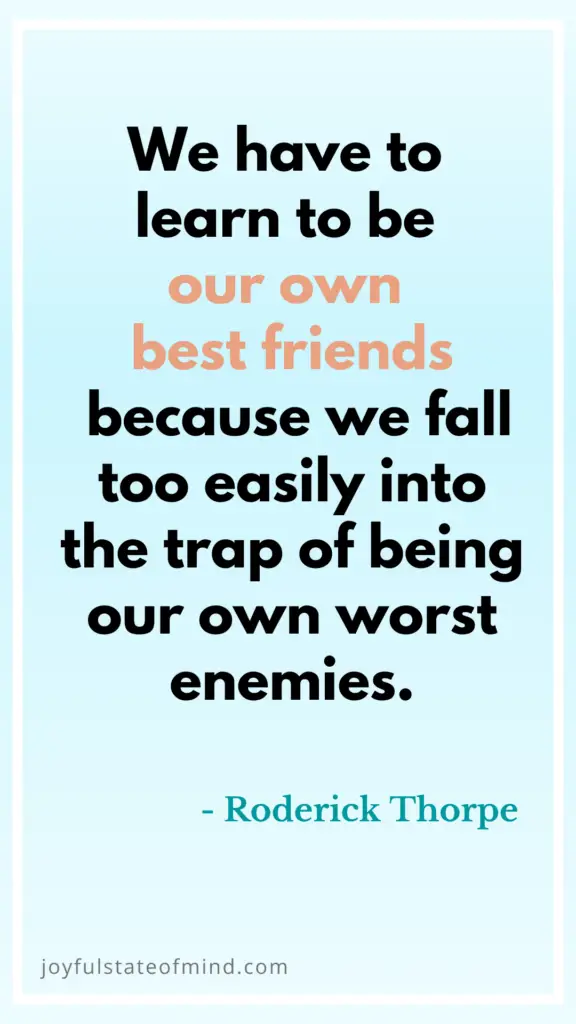
References:
1. Raising Low Self-Esteem – NHS UK
2. https://pmc.ncbi.nlm.nih.gov/articles/PMC5747942/
3 https://pmc.ncbi.nlm.nih.gov/articles/PMC9306298
4. same as above.
5. 5 Ways To Use Body Language to Change Your Mood
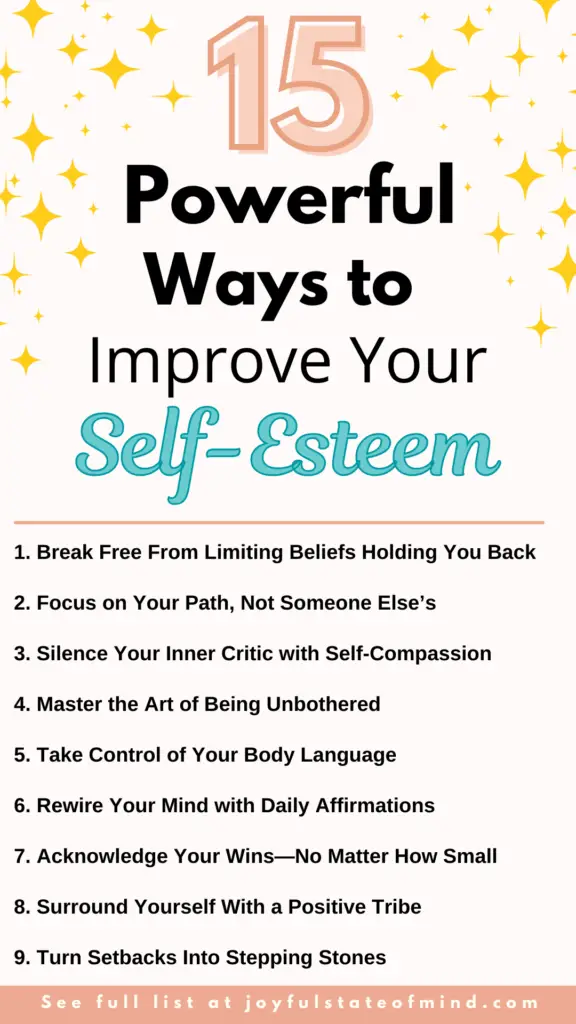
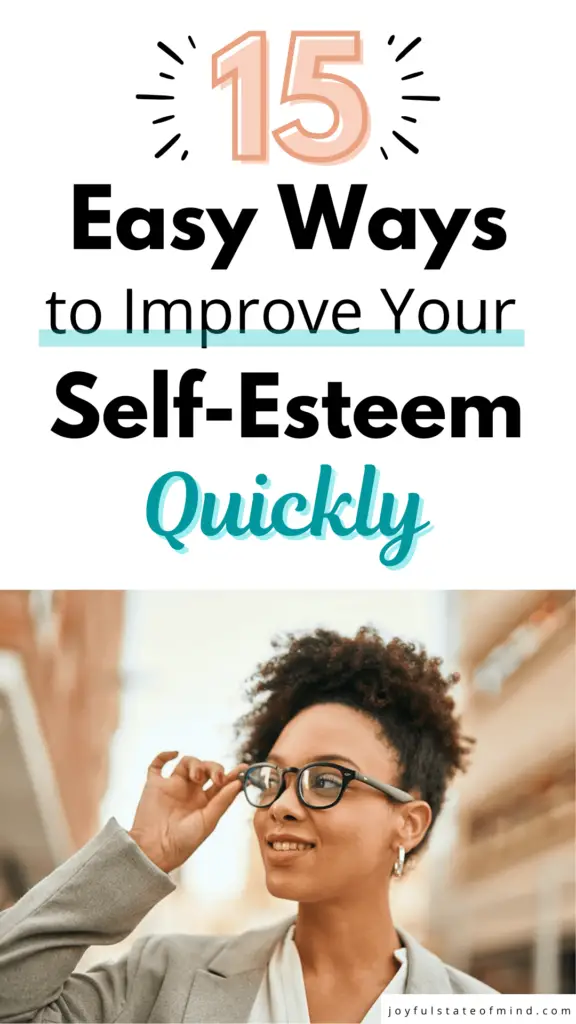











Being my worst critic and mastering the art of being unbothered are hard for me. I love that you included how to do it after each way. The books are a great reference, too!
Jill
I hear you, Jill. Those two are hard for most people. Being unbothered takes time and practice; I still work on it, but every step you take towards letting things go and not taking them too personally makes such a difference!
This is such a gem, Martha! I love how you pointed out that you don’t have to be born with high self-esteem or a healthy dose of it, we can absolutely develop it as time goes on and I know that I’ve found the older I get, the more that I have as far as just knowing how important it is to take care of myself – that makes me better able to take care others too. Self-limiting beliefs can be a big one for me, thanks so much for sharing this my dear friend! I pinned it!
I’ve found that too with getting older, and I’m glad you’ve recognized the importance of caring for yourself so you also have more to give to others. Self-limiting beliefs are probably the biggest one for anyone struggling with self-esteem. Thanks so much for your comment, Ashley and for the pin. 🙂